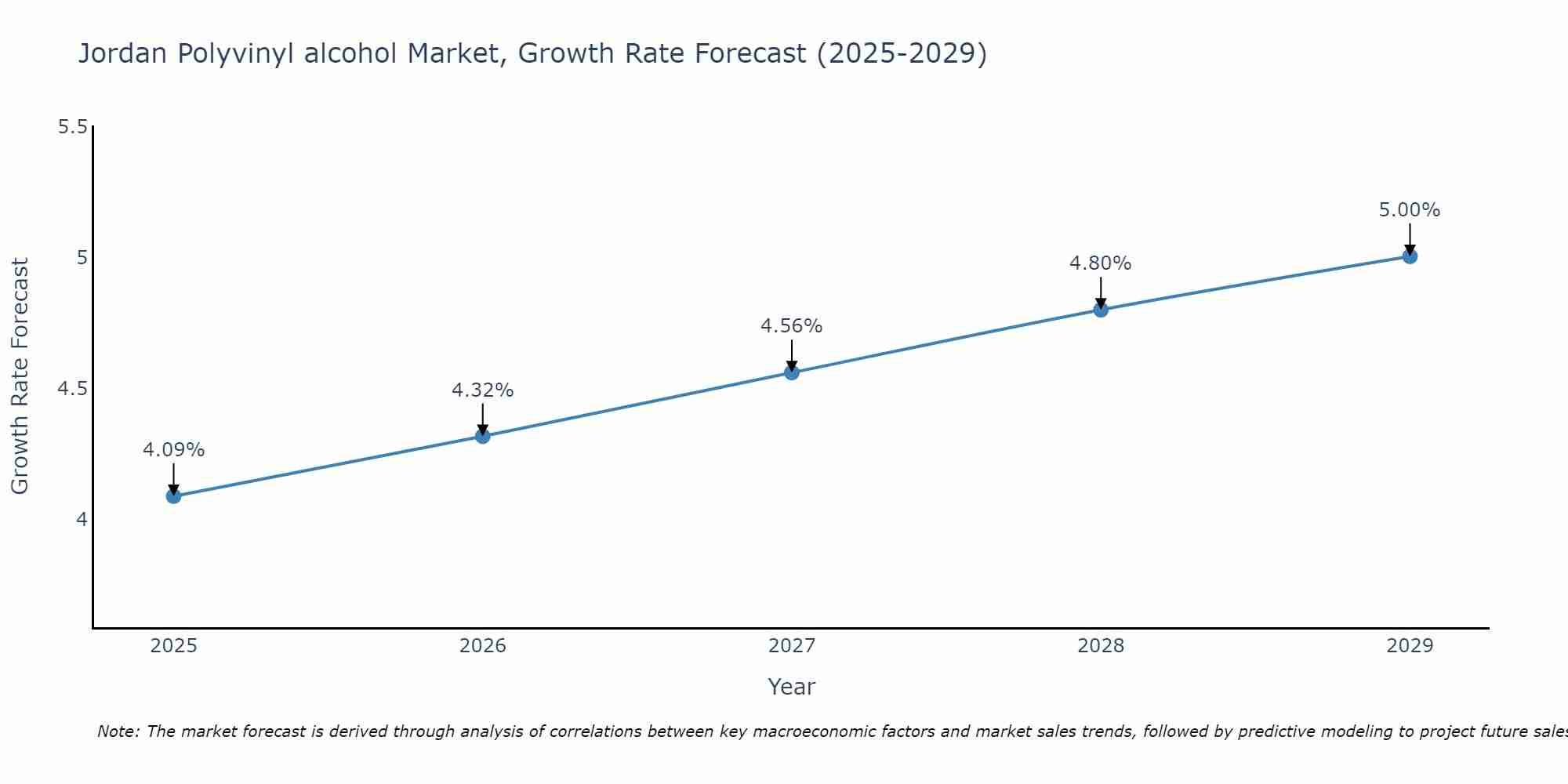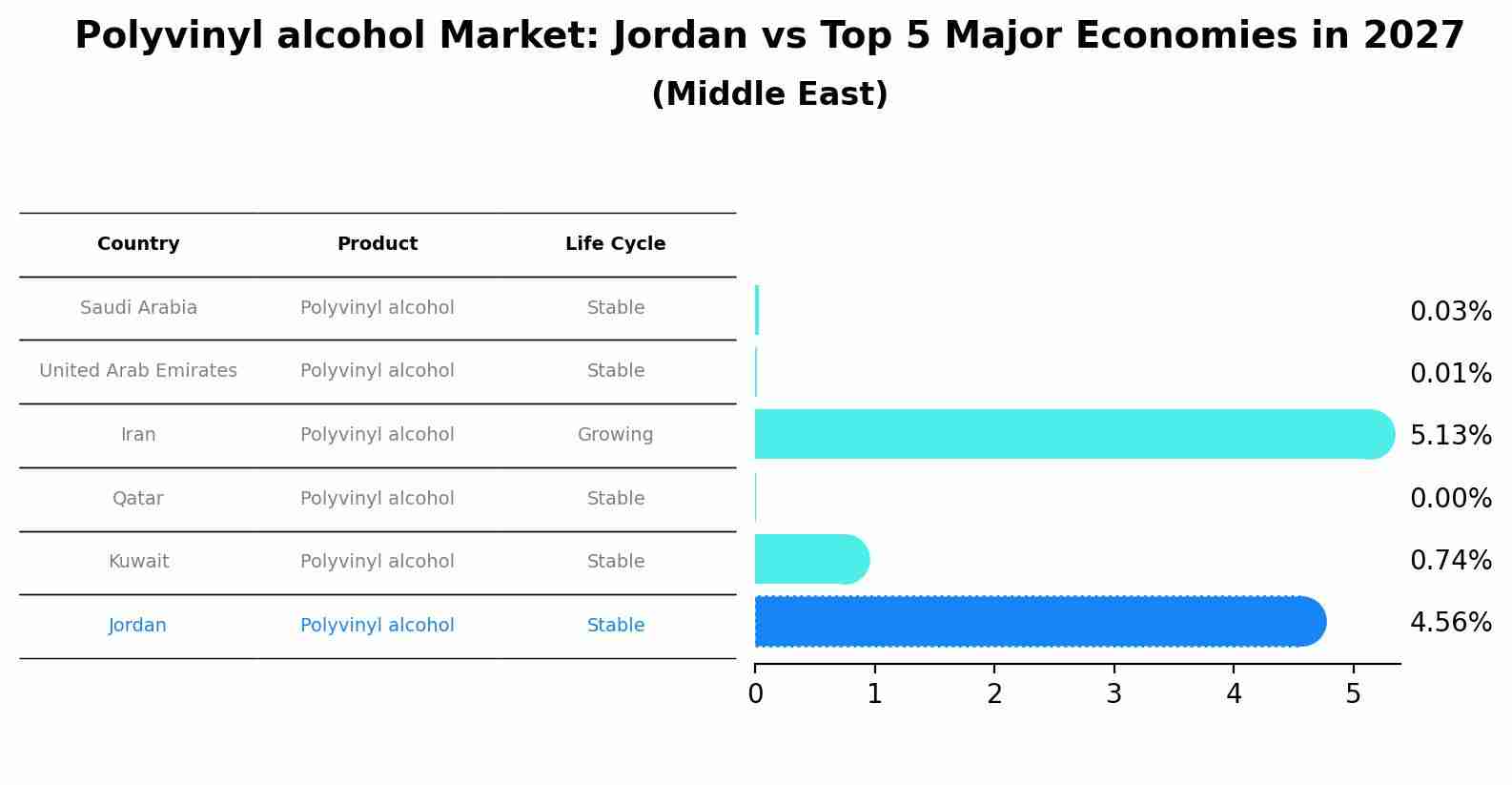Jordan Polyvinyl alcohol Market Outlook | Industry, Trends, Forecast, Growth, Revenue, Analysis, Companies, Value, Share, COVID-19 IMPACT & Size
| Product Code: ETC092105 | Publication Date: Jun 2021 | Updated Date: Jun 2025 | Product Type: Report | |
| Publisher: 6Wresearch | Author: Shubham Deep | No. of Pages: 70 | No. of Figures: 35 | No. of Tables: 5 |
Jordan Polyvinyl alcohol Market Size Growth Rate
The Jordan Polyvinyl alcohol Market is poised for steady growth rate improvements from 2025 to 2029. Commencing at 4.09% in 2025, growth builds up to 5.00% by 2029.

Polyvinyl alcohol Market: Jordan vs Top 5 Major Economies in 2027 (Middle East)
The Polyvinyl alcohol market in Jordan is projected to grow at a stable growth rate of 4.56% by 2027, highlighting the country's increasing focus on advanced technologies within the Middle East region, where Saudi Arabia holds the dominant position, followed closely by United Arab Emirates, Iran, Qatar and Kuwait, shaping overall regional demand.

Jordan Polyvinyl alcohol Market Overview
The Jordan Polyvinyl alcohol market is experiencing steady growth due to the increasing demand from various industries such as packaging, construction, textiles, and pharmaceuticals. Polyvinyl alcohol (PVA) is a versatile polymer known for its excellent film-forming properties, making it a popular choice for packaging materials, adhesives, and coatings. The growing awareness about eco-friendly products has also contributed to the market`s expansion, as PVA is biodegradable and non-toxic. Additionally, the construction sector in Jordan is driving the demand for PVA-based products like adhesives and binders. Key players in the market are focusing on product innovation and strategic partnerships to gain a competitive edge in this growing market. Overall, the Jordan Polyvinyl alcohol market is poised for continued growth in the coming years.
Jordan Polyvinyl alcohol Market Trends
The Jordan Polyvinyl alcohol market is experiencing steady growth due to its increasing applications in various industries such as packaging, construction, textiles, and electronics. The demand for environmentally friendly and sustainable products has led to a rise in the use of Polyvinyl alcohol as it is biodegradable and non-toxic. Additionally, the growing awareness about the benefits of using Polyvinyl alcohol in water-soluble applications, such as in detergents and adhesives, is further driving market growth. Manufacturers in Jordan are focusing on product innovation and development to cater to the evolving needs of consumers. The market is also witnessing collaborations between key players and research institutions to enhance product quality and expand market reach. Overall, the Jordan Polyvinyl alcohol market is poised for continued growth in the coming years.
Jordan Polyvinyl alcohol Market Challenges
In the Jordan Polyvinyl alcohol market, challenges primarily revolve around the limited awareness and understanding of the product among potential customers. This lack of awareness hinders market penetration and adoption rates. Additionally, the availability of cheaper alternatives and substitutes poses a challenge to the growth of the Polyvinyl alcohol market in Jordan. Furthermore, the fluctuating prices of raw materials used in the production of Polyvinyl alcohol can impact the overall cost structure for manufacturers, leading to pricing challenges. Moreover, the regulatory environment and trade policies can also present obstacles in terms of import/export restrictions or compliance requirements. Overall, addressing these challenges through targeted marketing strategies, product differentiation, and fostering strong relationships with key stakeholders will be crucial for the growth and sustainability of the Polyvinyl alcohol market in Jordan.
Jordan Polyvinyl alcohol Market Investment Opportunities
The Jordan polyvinyl alcohol market presents several investment opportunities due to the growing demand for this versatile polymer in various industries such as construction, packaging, textile, and pharmaceuticals. With the construction sector expanding and the government investing in infrastructure projects, there is a rising need for PVA-based products like adhesives, coatings, and concrete additives. Additionally, the increasing focus on sustainable packaging solutions is driving the demand for PVA in the packaging industry. Investing in Jordan`s polyvinyl alcohol market offers potential for growth and diversification, especially with the country`s strategic location providing access to regional markets. As the market continues to evolve, opportunities for innovation and collaboration with local manufacturers can further enhance the investment prospects in this sector.
Jordan Polyvinyl alcohol Market Government Policy
The Jordanian government has implemented various policies related to the Polyvinyl alcohol (PVA) market to support domestic production and reduce dependency on imports. These policies include providing subsidies and incentives to local PVA manufacturers, promoting research and development activities to enhance product quality and innovation, and imposing tariffs on imported PVA products to protect the domestic industry. Additionally, the government has established regulations to ensure environmental sustainability in PVA production processes and encourage the adoption of green technologies. Overall, these policies aim to strengthen the competitiveness of the Jordanian PVA market, stimulate economic growth, and create employment opportunities in the country`s chemical industry sector.
Jordan Polyvinyl alcohol Market Future Outlook
The Jordan Polyvinyl alcohol market is expected to experience steady growth in the coming years due to increasing demand from various end-use industries such as construction, packaging, textiles, and pharmaceuticals. The growing construction sector in Jordan, driven by infrastructure development projects and urbanization, is likely to boost the demand for Polyvinyl alcohol as it is widely used in construction materials. Additionally, the rising trend towards sustainable and eco-friendly products is expected to drive the adoption of Polyvinyl alcohol, known for its biodegradability and environmentally friendly properties. Moreover, ongoing research and development activities aimed at enhancing the properties and applications of Polyvinyl alcohol are anticipated to further fuel market growth. Overall, the Jordan Polyvinyl alcohol market is poised for a positive outlook in the foreseeable future.
Key Highlights of the Report:
- Jordan Polyvinyl alcohol Market Outlook
- Market Size of Jordan Polyvinyl alcohol Market, 2021
- Forecast of Jordan Polyvinyl alcohol Market, 2027
- Historical Data and Forecast of Jordan Polyvinyl alcohol Revenues & Volume for the Period 2018 - 2027
- Jordan Polyvinyl alcohol Market Trend Evolution
- Jordan Polyvinyl alcohol Market Drivers and Challenges
- Jordan Polyvinyl alcohol Price Trends
- Jordan Polyvinyl alcohol Porter's Five Forces
- Jordan Polyvinyl alcohol Industry Life Cycle
- Historical Data and Forecast of Jordan Polyvinyl alcohol Market Revenues & Volume By Grade for the Period 2018 - 2027
- Historical Data and Forecast of Jordan Polyvinyl alcohol Market Revenues & Volume By Partially Hydrolyzed for the Period 2018 - 2027
- Historical Data and Forecast of Jordan Polyvinyl alcohol Market Revenues & Volume By Fully Hydrolyzed for the Period 2018 - 2027
- Historical Data and Forecast of Jordan Polyvinyl alcohol Market Revenues & Volume By End-use Industry for the Period 2018 - 2027
- Historical Data and Forecast of Jordan Polyvinyl alcohol Market Revenues & Volume By Food Packaging for the Period 2018 - 2027
- Historical Data and Forecast of Jordan Polyvinyl alcohol Market Revenues & Volume By Textile for the Period 2018 - 2027
- Historical Data and Forecast of Jordan Polyvinyl alcohol Market Revenues & Volume By Paper for the Period 2018 - 2027
- Historical Data and Forecast of Jordan Polyvinyl alcohol Market Revenues & Volume By Medical for the Period 2018 - 2027
- Historical Data and Forecast of Jordan Polyvinyl alcohol Market Revenues & Volume By Construction for the Period 2018 - 2027
- Historical Data and Forecast of Jordan Polyvinyl alcohol Market Revenues & Volume By Electronics for the Period 2018 - 2027
- Jordan Polyvinyl alcohol Import Export Trade Statistics
- Market Opportunity Assessment By Grade
- Market Opportunity Assessment By End-use Industry
- Jordan Polyvinyl alcohol Top Companies Market Share
- Jordan Polyvinyl alcohol Competitive Benchmarking By Technical and Operational Parameters
- Jordan Polyvinyl alcohol Company Profiles
- Jordan Polyvinyl alcohol Key Strategic Recommendations
Frequently Asked Questions About the Market Study (FAQs):
- Single User License$ 1,995
- Department License$ 2,400
- Site License$ 3,120
- Global License$ 3,795
Search
Related Reports
- Australia IT Asset Disposal Market (2025-2031) | Strategy, Consumer Insights, Analysis, Investment Trends, Opportunities, Growth, Size, Share, Industry, Revenue, Segments, Value, Segmentation, Supply, Forecast, Restraints, Outlook, Competition, Drivers, Trends, Demand, Pricing Analysis, Competitive, Strategic Insights, Companies, Challenges
- UAE Building Thermal Insulation Market Outlook (2025-2031) | Revenue, Companies, Share, Trends, Growth, Size, Forecast, Industry, Analysis & Value
- Portugal Electronic Document Management Market (2025-2031) | Strategy, Consumer Insights, Analysis, Investment Trends, Opportunities, Growth, Size, Share, Industry, Revenue, Segments, Value, Segmentation, Supply, Forecast, Restraints, Outlook, Competition, Drivers, Trends, Demand, Pricing Analysis, Competitive, Strategic Insights, Companies, Challenges
- France Electronic Document Management Market (2025-2031) | Strategy, Consumer Insights, Analysis, Investment Trends, Opportunities, Growth, Size, Share, Industry, Revenue, Segments, Value, Segmentation, Supply, Forecast, Restraints, Outlook, Competition, Drivers, Trends, Demand, Pricing Analysis, Competitive, Strategic Insights, Companies, Challenges
- Portugal Occupational Health & Safety Services Market (2025-2031) | Strategy, Consumer Insights, Analysis, Investment Trends, Opportunities, Growth, Size, Share, Industry, Revenue, Segments, Value, Segmentation, Supply, Forecast, Restraints, Outlook, Competition, Drivers, Trends, Demand, Pricing Analysis, Competitive, Strategic Insights, Companies, Challenges
- Netherlands Occupational Health and Safety Services Market (2025-2031) | Strategy, Consumer Insights, Analysis, Investment Trends, Opportunities, Growth, Size, Share, Industry, Revenue, Segments, Value, Segmentation, Supply, Forecast, Restraints, Outlook, Competition, Drivers, Trends, Demand, Pricing Analysis, Competitive, Strategic Insights, Companies, Challenges
- Belgium and Luxembourg Facility Management Market (2025-2031) | Strategy, Consumer Insights, Analysis, Investment Trends, Opportunities, Growth, Size, Share, Industry, Revenue, Segments, Value, Segmentation, Supply, Forecast, Restraints, Outlook, Competition, Drivers, Trends, Demand, Pricing Analysis, Competitive, Strategic Insights, Companies, Challenges
- Russia Women Intimate Apparel Market (2025-2031) | Strategy, Consumer Insights, Analysis, Investment Trends, Opportunities, Growth, Size, Share, Industry, Revenue, Segments, Value, Segmentation, Supply, Forecast, Restraints, Outlook, Competition, Drivers, Trends, Demand, Pricing Analysis, Competitive, Strategic Insights, Companies, Challenges
- Africa Chocolate Market (2025-2031) | Size, Share, Trends, Growth, Revenue, Analysis, Forecast, industry & Outlook
- Global Hydroxychloroquine And Chloroquine Market (2025-2031) | Industry, Trends, Size, Outlook, Growth, Value, Companies, Revenue, Analysis, Share, Forecast
Industry Events and Analyst Meet
Our Clients
Whitepaper
- Middle East & Africa Commercial Security Market Click here to view more.
- Middle East & Africa Fire Safety Systems & Equipment Market Click here to view more.
- GCC Drone Market Click here to view more.
- Middle East Lighting Fixture Market Click here to view more.
- GCC Physical & Perimeter Security Market Click here to view more.
6WResearch In News
- Doha a strategic location for EV manufacturing hub: IPA Qatar
- Demand for luxury TVs surging in the GCC, says Samsung
- Empowering Growth: The Thriving Journey of Bangladesh’s Cable Industry
- Demand for luxury TVs surging in the GCC, says Samsung
- Video call with a traditional healer? Once unthinkable, it’s now common in South Africa
- Intelligent Buildings To Smooth GCC’s Path To Net Zero













